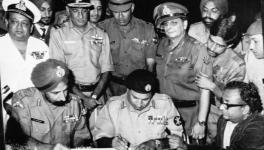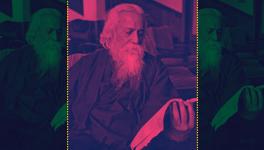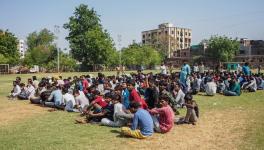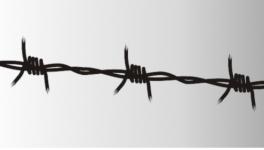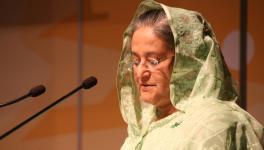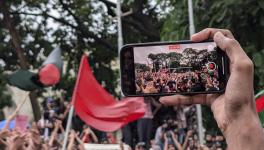Bangladesh: A Personal Worry
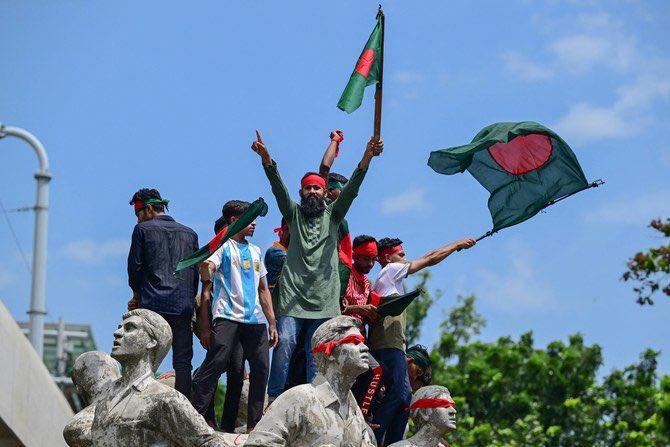
Protesters in Bangladesh. (Image Credit: @AsadAToor X)
I don’t consider myself a political analyst, that too of another country. My wishful as well as self-gratifying imagination doesn’t stretch that far. But, like many others, I cannot forget the fact that I was born some 87 plus years ago in that area of the world. Although I am very much an Indian now, and owe to India for what I have become, I have had the opportunity of developing a strong link with Bangladesh, after 1988, to the extent of visiting that country at least five or six times every year.
Not only that, during a collaborative work with Dhaka Bangla Academy during 2010-2012, I had to stay there for stretches of three or four weeks, at least four times a year. That work, a grammar of our common language, Bengali (its standard variety) has long been finished, but the country hasn’t withdrawn her welcome to this truant son of hers.
The reasons were varied and sundry. Lectures, seminars, literary meets, viva voce of Ph.D. candidates, convocation addresses and what not. Allow me to add that, many of my relatives continued to, and do still live in Bangladesh, one of the closest being my twin sister, who died some five years ago.
Yes, I was in Bangladesh recently, from July 18 to 21, almost imprisoned in a eighth floor flat, otherwise enjoying the proverbially sumptuous hospitality of the family of a Bangladeshi Muslim friend. I could not go out to see how the students were protesting, the police or para-military force shooting bullets or tear-gas shells. But I heard, from my hosts, some bizarre rumours that were doing the rounds. One was, the police and the para- or pure military personnel that were shooting people were all disguised Indians’. Two, ‘Sheikh Hasina has fled the country (so prophetic at that time!). And three, ‘Khaleda Zia has been killed (may she live forever!)’.
When I heard these rumours, I refused to be surprised myself, as on an earlier occasion some five years ago, I heard from a Dhaka taxi driver that Sheikh Mujib himself had donated big chunks of Bangladeshi land to India at the time of the liberation war.
In those four fateful days, however, my only, and selfish, worry in this period was how soon I can come back to India. My friends in Bangladesh, a Justice of the Supreme Court (he has since been forced to retire) and the Chief Advisor to the Prime Minister (I have no news of him as yet) helped me procure an advance air booking and I came back to my country, safe and sound.
On my way back from the Dhaka airport, I saw two charred motor cars, but otherwise the traffic, including the air-traffic, seemed normal. I heaved a deep sigh of relief, as I learned that the Bangladesh Supreme Court had, the day before, scratched the old quota plan and allowed 93% academic merit for priority consideration. The liberation army quota was brought down from 30% to a meagre 5%. I thought peace would prevail in Bangladesh now, as I return to my safe haven in Kolkata.
I was patently wrong. I had a premonition that I would be wrong. When I was on my way to my location in Dhaka, I found troupes of young men and not-so-young men, with motorbike helmets on their heads and bamboo maces in their hands, marching in a confrontational mood, although I witnessed no direct action. I saw several such groups. That was on the 18th, and, everyone knows, police had shot dead six people the day before. So, the groups I saw were in a menacing and belligerent mood, but, as I have already said, I witnessed no confrontation on the streets.
After four days of enclosed existence, I was driven back to the airport by my host. It was early morning, and I found what I thought was normal traffic at that time of the day. I thought Dhaka was slowly coming back to normal everyday life. Students would be pacified now and everybody would live happily ever after.
But Bangladesh, ever so addicted to precarious living, did not do so. I could hardly foresee that neither the students, nor the people supporting them would be happy at what was conceded by their government. At that point, the earlier motive of the protest was obscured and hues and cries about a ‘fascist rule of 15 years’, ‘no fair elections held for the last two terms’, ‘the land’s money siphoned away by the Awami League higher ups to foreign banks’, ‘illegal imprisonments and untold tortures of the Opposition’, ‘Sheikh Hasina has sold Bangladesh to India!’ ‘Look at her wardrobe!’etc., were being heard.
The protest of the students was changing colour and was slowly growing into a revolt of millions of people. The gathering storm soon turned into a tornado that swept away a government of 15 years, which had seemed so stable and secure even some 20 days ago. Sheikh Hasina had to flee her country hurriedly in a military helicopter and became, at least for the time being, quite irrelevant and forgotten. She, however, left, for her country at least, a bitter memory. The August Revolution, as they call it now, was accomplished.
As I said at the outset, I am quite a layman, and did not at all understand the turn of events. I still don’t understand why all this happened. How a simple demand for the restructuring of a patently anachronistic quota system could, incongruously to my mind, attract other issues and reach such a devastating dimension?
Two questions began to agitate my mind: one, was it merely an internal affair, a fomentation of national unhappiness against the earlier government which grew into such a destroying storm? Did Hasina’s emotional reactions forcing her to use words like ‘razakar’ and her dogged refusal to express sorrow on the killings of the students aggravate it further? Or, perhaps, the utterance of Jay Bangabondhu and swearing by the name of the Father of the Nation much too often by speakers in a meeting were becoming too oppressive a practice?
And, two, was it the machinations of more than one international force, including the perennial Big Brother the US, and its cohort, Pakistan? Was Hasina’s refusal to the US to have a foothold at the St. Martin Island have something to do with it? Or the latter’s rumoured plan to create a Christian state in North-east of India -- a la Timor in Indonesia, had any connection? Was it the same vintage game-plan of ‘containment’ against the US’s arch enemy, China?
I’m too feeble-brained to go for the right answers of these questions. I know that Mohammed Yunus was a darling of the US, as Hillary Clinton once pleaded to Sheikh Hasina for his exoneration and was refused, but I don’t know where the Nobel Laureate for Peace stands now. Wherever that may be, he seems to be the chosen leader of Bangladesh now, including that of the revolting students and all, and is, apparently, the most powerful person there, in whose hands the fate of the country rests. Whether this power is only an illusion, and the military, the students, the happy opponents of the fled Prime Minister will play an innocently submissive role and give him unstinted support for long, only the future will tell.
So far, so good. A provisional government has been announced. Some say it’s also ‘illegal’, as it has been installed on oaths taken from the Constitution that has become invalid. The old judiciary has been swept clean of judges ‘obedient’ to the early regime, and I don’t know at what other sectors such a cleansing operation will be attempted at next? The bureaucracy? Police? Already some 500 police officers are reportedly absconding, while quite a few died at the hands of the mob, police stations have been gutted.
To restore the morale of the non-military force will be a hard task for the new government. What will be the fate of intellectuals who were close to the earlier government? Those who were active in the cultural and sports arena? I saw an utterance making rounds in social media, that of Yunus, that cricket was a useless pastime and he intended to ban cricket playing in Bangladesh. This may be a fake news, but the new government must make clear its intentions, as to what it is going to do in these sensitive sectors. How far does it want to go? Can it ‘cleanse’ the whole system and refurbish it with fresh recruits? That will be no easy task. It can always have a band of people who would change allegiance, driven by threat of temptation, but such quicksilver allegiance is always suspect.
Sheikh Mujibur Rahman, the Father of the Nation, has received a nasty battering in this August Revolution. He had, of course, faced a worse fate before, as he was killed, in the same month in 1975. But then his glory was revived, and he was voted, in a BBC poll, the greatest Bengali in a thousand years. But the cycle has started moving again, and he is perhaps going to be the victim of another national forgetfulness, into disdain.
With Mujib’s passing into oblivion, who knows for how long, many other things also move into a land of uncertainty. I am not bothered about India’s relations with Bangladesh. I am sure the governments of the two nations will soon realise that a cordial as well as working relationship is the best bet for both, and antagonising one another will not be a viable strategy.
Nor am I unduly worried about the principles of socialism or communal harmony that Mujib and Hasina stood for. I know that minorities became a target in the disturbances and lost lives, property and molesting of minority girls were also reported. But such things are, one hopes, going to die down. The new interim government also has taken a positive stand on the protection of the minorities and on friendly relations with India.
But as a mean, parochial Bengali, I was somewhat perturbed to find a Rabindranath Tagore statue was battered, as that of Sheikh Mujib. And, along with that, I was and concerned about what is going to be the fate of the song Sonar Bangla, their national anthem. And to what extent Tagore’s creations would continue to be read, sung, recited, acted on stage of the Bangladesh of the near future. The ‘provisional’ Government has not spoken its mind about such marginal things. These things I say keeping in mind the fact that Bangladesh has some of the finest singers of Tagore songs, finest scholars on Tagore, and producers of Tagore plays who have done us proud by their work.
Tagore, I think, can take as much battering as Mujib can. Perhaps even more.
The writer, a noted linguist, is a doctorate from Chicago University. He is former Vice Chancellor of Rabindra Bharati University and was in Chattogram when violence erupted in Bangladesh.
Get the latest reports & analysis with people's perspective on Protests, movements & deep analytical videos, discussions of the current affairs in your Telegram app. Subscribe to NewsClick's Telegram channel & get Real-Time updates on stories, as they get published on our website.










